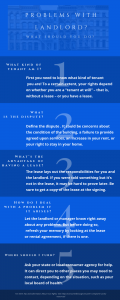That’s a common question that consumers ask state and local consumer agencies. Here’s what you need to know to stand up for your rights effectively.
What kind of tenant am I?
First you need to know what kind of tenant you are! To a certain extent, your rights depend on whether you are a “tenant at will” – that is, without a lease – or you have a lease.
What is the dispute?
Chances are that your problem concerns the condition of the building, a failure to provide agreed upon services, an increase in your rent, or your right to stay in your home.
What’s the advantage of having a lease?
If you have a lease, that document will probably address your concerns. The lease lays out the responsibilities for you and the landlord. Before you sign it, carefully review all its terms and ask questions about anything you don’t understand. Take your time to make sure that everything that you and your landlord have agreed to is written into that lease. If you were told something but it’s not in the lease, it may be hard to prove later. Be sure to get a copy of the lease at the signing. A lease locks in the rent for a certain period of time, typically a year, and it also locks you in to pay it for the entire time. It may be possible to break a lease, however, under certain circumstances. With a lease, the landlord can’t evict you without good cause.
Some landlords give tenants written rental agreements that spell out the terms such as the amount of the monthly rent but that do not have an end date, meaning that the agreement can be changed at any time.
How do I deal with a problem if it arises?
Try to keep communications with your landlord or the manager open, friendly and professional. Also keep proof of your rental payments.
Let the landlord or manager know right away about any problems. But before doing so, refresh your memory by looking at the lease or rental agreement, if there is one. Even without a written agreement, you probably have basic rights under state law – for instance, the right to expect that the landlord will maintain the property to meet health and building codes. You may also have the right to a certain amount of notice if the landlord wants you to move. Check with your state or local consumer agency about your rights so you will be on firm footing when you contact the landlord or manager about the problem.
Keep a copy of any letters or emails you write for your records. If you have a verbal conversation, write down the date, who you spoke to, and what it was about. Follow up any promises to resolve the issue with a note of thanks and keep a copy in case that promise is not fulfilled. It’s also a good idea to document visible problems such as leaks, bugs, broken windows, or mold by taking pictures.
Where should I turn if my personal efforts to solve the problem fail?
Ask your state or local consumer agency for help. It can direct you to other places you may need to contact, depending on the situation, such as your local board of health. And it may be able to approach the landlord on your behalf to try to resolve the problem.
If your rental is subsidized, federal law may come into play as well. Your state or local consumer office can refer you to the right federal agency.
Most landlord/tenant problems are resolved without any formal legal action. If you require legal assistance, however, some nonprofit legal aid services provide free help to low-income tenants who qualify financially.
In some states, tenants are legally protected if landlords try to retaliate against them for standing up for their rights. Don’t be intimidated or put up with unsafe living conditions.

This blog is one of a series of articles contributed by state and local consumer agencies in connection with the annual survey about consumer complaints conducted by Consumer Federation of America. The survey report provides “real life” examples of complaints and tips for consumers. Have a consumer problem or question? Find your state or local consumer agency at https://www.usa.gov/state-consumer.

